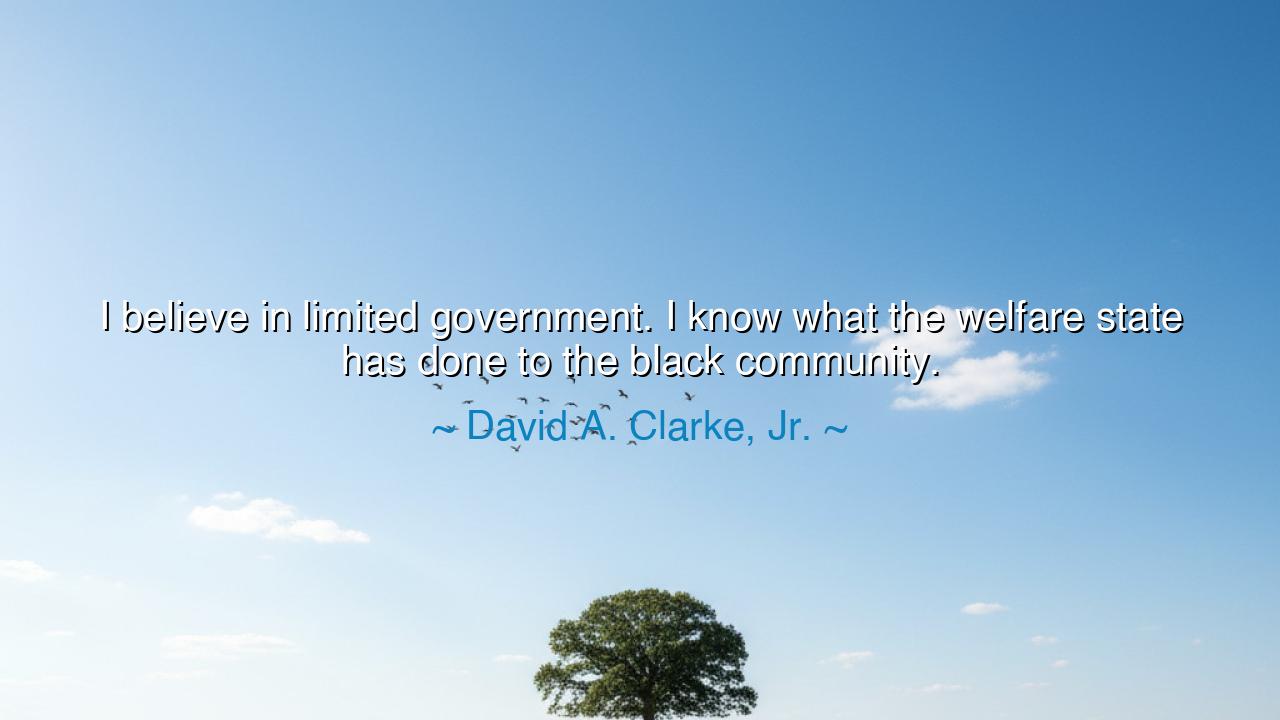
I believe in limited government. I know what the welfare state
I believe in limited government. I know what the welfare state has done to the black community.






Hearken, children of insight and seekers of understanding, to the words of David A. Clarke, Jr., who spoke with unflinching candor: "I believe in limited government. I know what the welfare state has done to the black community." In this statement lies a meditation on freedom, responsibility, and the unintended consequences of power. Clarke reminds us that authority, though often intended for aid and protection, can, if unchecked, foster dependence, weaken initiative, and erode the very communities it seeks to serve.
The origin of Clarke’s insight emerges from observation of social and economic policy in the United States. The welfare state, designed to provide support to the needy, has, over decades, created systems that can unintentionally disempower communities. Clarke emphasizes that limited government is not merely a political stance, but a recognition that liberty, responsibility, and self-reliance are the cornerstones of human dignity and societal strength. Where intervention becomes overreach, it may stifle ambition, innovation, and the resilience required for communities to thrive.
Consider the imagery of the welfare state as a double-edged sword. Aid, when offered without fostering opportunity, can become a chain rather than a bridge. Clarke’s words suggest that assistance must be paired with empowerment, guiding individuals and communities to independence rather than prolonged dependence. True progress flows not from reliance alone, but from the cultivation of skills, self-discipline, and moral and economic agency.
History provides vivid exemplars of this principle. During the Great Migration, African American families moved north in pursuit of opportunity, escaping oppression in the rural South. Those who embraced education, labor, and self-reliance built thriving communities despite systemic obstacles. Conversely, in areas where dependency on state assistance became entrenched, social cohesion, economic mobility, and family structures often weakened, illustrating Clarke’s caution: well-intentioned aid may bring unintended consequences if not balanced with responsibility and empowerment.
Clarke’s reflection is also a meditation on the delicate balance between liberty and governance. Government has the power to uplift, but unchecked power can suppress initiative. Limited government, by contrast, trusts the individual and the community, allowing enterprise, ingenuity, and moral responsibility to flourish. It acknowledges that the wisdom of those closest to their lives—the families, neighbors, and local communities—is often more attuned to real needs than distant bureaucrats.
The lesson is eternal: freedom and responsibility are inseparable. Aid without accountability diminishes self-reliance; authority without restraint diminishes liberty. Clarke reminds us that societal flourishing arises not merely from external support, but from the internal strength of families and communities, reinforced by the moral and practical discipline to act, to provide, and to aspire. Power, when limited, nurtures both opportunity and dignity.
Practical actions follow naturally: support policies that encourage self-reliance, education, and opportunity; engage in mentorship and community-building that strengthens families and local networks; scrutinize programs to ensure they empower rather than create dependency; and cultivate personal and communal responsibility as a guiding principle. By doing so, citizens honor both liberty and justice, ensuring that aid serves as a bridge, not a barrier.
In sum, Clarke’s words illuminate a profound truth: limited government preserves freedom, nurtures responsibility, and strengthens communities. Let this wisdom guide both policymakers and citizens, reminding us that the greatest support often comes not from overreach, but from creating conditions where human potential, ambition, and resilience can flourish. In this balance lies the enduring foundation of both liberty and prosperity.
If you wish, I can craft an even more epic, mythic version, turning Clarke’s reflection into a heroic narrative of freedom, responsibility, and the moral consequences of governance—perfect for immersive audio storytelling. Do you want me to do that?






AAdministratorAdministrator
Welcome, honored guests. Please leave a comment, we will respond soon